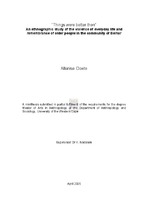"Things were better then": an ethnographic study of the violence of everyday life and remembrance of older people in the community of Belhar"
Abstract
This minithesis provides an ethnographic account of the life world of older people in the community of Belhar in the Cape Peninsula, which was historically categorised as a 'coloured' community during the implementation of the Group Areas Act. By content analysing newspaper articles published in the early 1980s and specifically during the implementation of the Group Areas Act I found that many of the residents reported that they lived in fear of their lives, in what was once known as a 'prestige suburb'. At the present time the community of Belhar is an intensely gang-infested area. From preliminary research done by myself at a senior citizen centre in Belhar, the high incidence of violence was a recurring theme throughout discussions with older people. In fact when I posed the question Why do you come to the centre five days a week? to a group of older people they answered without hesitation It is unsafe for an older person to be alone during the day. Answers like these to many of the questions that I posed would almost always be followed with Things were better then. It also was apparent that the older people in this community remember (or perhaps reconstruct) the past in the context of their present living situation. This became the leading theme in my study and is also the background against which I had formulated my research questions. However this study not only focused on the impact of the high incidence of violence on the community of older people but also essentially looked at elderly residents; everyday lived experiences in Belhar. The research sample consisted of twenty elderly residents and four key informants. The latter provided mainly infrastructural data on the community. Primary data was collected by using ethnographic techniques of inquiry which included participant observation and unstructured interviews. Results revealed that older people occupy a liminal space both in the community and in their households. I also found that the elderly stroke victim is twice silenced and marginalized due to the constraints brought on by their chronic illness and their status as an older person in the community.

